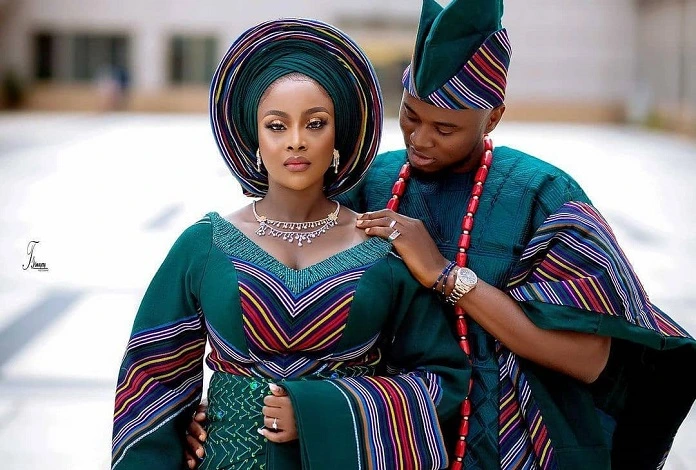Nigeria, a country with over 250 ethnic groups, is a melting pot of cultures and traditions. Each ethnic group boasts a rich heritage that is beautifully reflected in their traditional wears. From the flamboyant and colorful outfits of the Yoruba to the intricately woven fabrics of the Igbo, Nigerian traditional wears are a feast for the eyes and a testament to the nation’s cultural diversity. In this article, we will explore some of the most popular types of traditional wears in Nigeria.

1. Yoruba Traditional Wears
The Yoruba people, one of Nigeria’s largest ethnic groups, are known for their vibrant and sophisticated traditional attires. The “Aso Oke” is a popular Yoruba fabric made from handwoven cotton or silk. It is often used to create stunning outfits like “Buba” (a loose-fitting blouse), “Iro” (wrapper), and “Agbada” (a flowing gown). The Yoruba traditional wears are characterized by intricate embroidery, patterns, and embellishments, making them a sight to behold during weddings, festivals, and other cultural events.
2. Igbo Traditional Wears
The Igbo people, hailing from the southeastern region of Nigeria, take pride in their traditional wears, especially the “George” fabric. The George is a brightly colored cloth adorned with ornate designs, and it is often draped over the shoulder or waist as a wrapper. Igbo men commonly wear the “Isiagu,” a patterned shirt, while women opt for the “Iro” and “Blouse” ensemble or the “George” wrapper paired with a blouse. The Igbo traditional wears are celebrated during occasions like “Igba Nkwu” (traditional marriage ceremonies) and cultural gatherings.
3. Hausa/Fulani Traditional Wears
The Hausa and Fulani ethnic groups, predominant in the northern regions of Nigeria, have a distinct style of traditional dressing. The “Baban Riga” is a flowing gown worn by men, while the women often don the “Bori” or “Kaftan,” complemented by colorful headscarves and intricate jewelry. The Hausa/Fulani traditional wears reflect a blend of elegance and modesty, with attention to fine details and embroidery.
4. Edo Traditional Wears
The Edo people, from the southern region of Nigeria, are renowned for their vibrant “Aso-Oke” wrappers and traditional coral beads. The “Iro” and “Buba” outfit for women is adorned with beautiful designs and embroidery, often paired with coral beads and headgear. Edo men wear the “Agbada” and “Isiagu” for special occasions. The Edo traditional wears are a celebration of culture and a symbol of prestige.
5. Efik/Ibibio Traditional Wears
The Efik and Ibibio ethnic groups, hailing from the southern coastal regions, have traditional wears that emphasize intricate designs and bold colors. The “George” fabric is also popular among these groups, often draped as a wrapper or sewn into stylish outfits for both men and women. The Efik/Ibibio traditional wears are showcased during cultural ceremonies, traditional marriages, and festivals.
6. Kanuri Traditional Wears
The Kanuri people, from the northeastern part of Nigeria, have traditional wears that showcase their unique identity. Men wear “Baban Riga” or “Kaftan” with embroidered caps, while women adorn themselves in flowing gowns called “Dara” or “Hijab.” The Kanuri traditional wears reflect a blend of Islamic influences and their rich cultural heritage.
Conclusion
The types of traditional wears in Nigeria are as diverse as the country itself. Each ethnic group’s attire is a testament to their rich cultural heritage and unique identity. From the flamboyant and colorful outfits of the Yoruba to the intricate designs of the Igbo, and the elegant simplicity of the Hausa/Fulani, Nigerian traditional wears are an enchanting kaleidoscope of colors, patterns, and craftsmanship. These traditional attires not only celebrate cultural diversity but also serve as a symbol of pride and unity among the Nigerian people.
